People are delaying, rather than buying, big-ticket items
Here’s what we know today from the Ipsos Consumer Tracker about AI; “Made in China”; inflation’s impact on items small (grocery) and big (homes, cars, etc.); plus a new installment of the Ipsos Care-o-Meter.
People are delaying, rather than buying, big ticket items
Why we asked: With conflicting signs in the markets for home improvement (having a rough quarter) and home building (having a good quarter), it seemed a good time to check in on inflation’s impacts on our purchases.
What we found: This is a question asked in the very first waves of the tracker, most recently in July 2020. If you look just at the Americans who say they’re “not in the market” there’s a big change in people shopping for automobiles (was 71%, now dropped to 53%), and roughly 10-point drops in mobile phones, home improvement and appliances. So that means more folks are IN the market generally. But of those folks who are in the market, overall there’s roughly a 2:1 ratio of people who say they’re delaying purchases vs. buying them across categories.
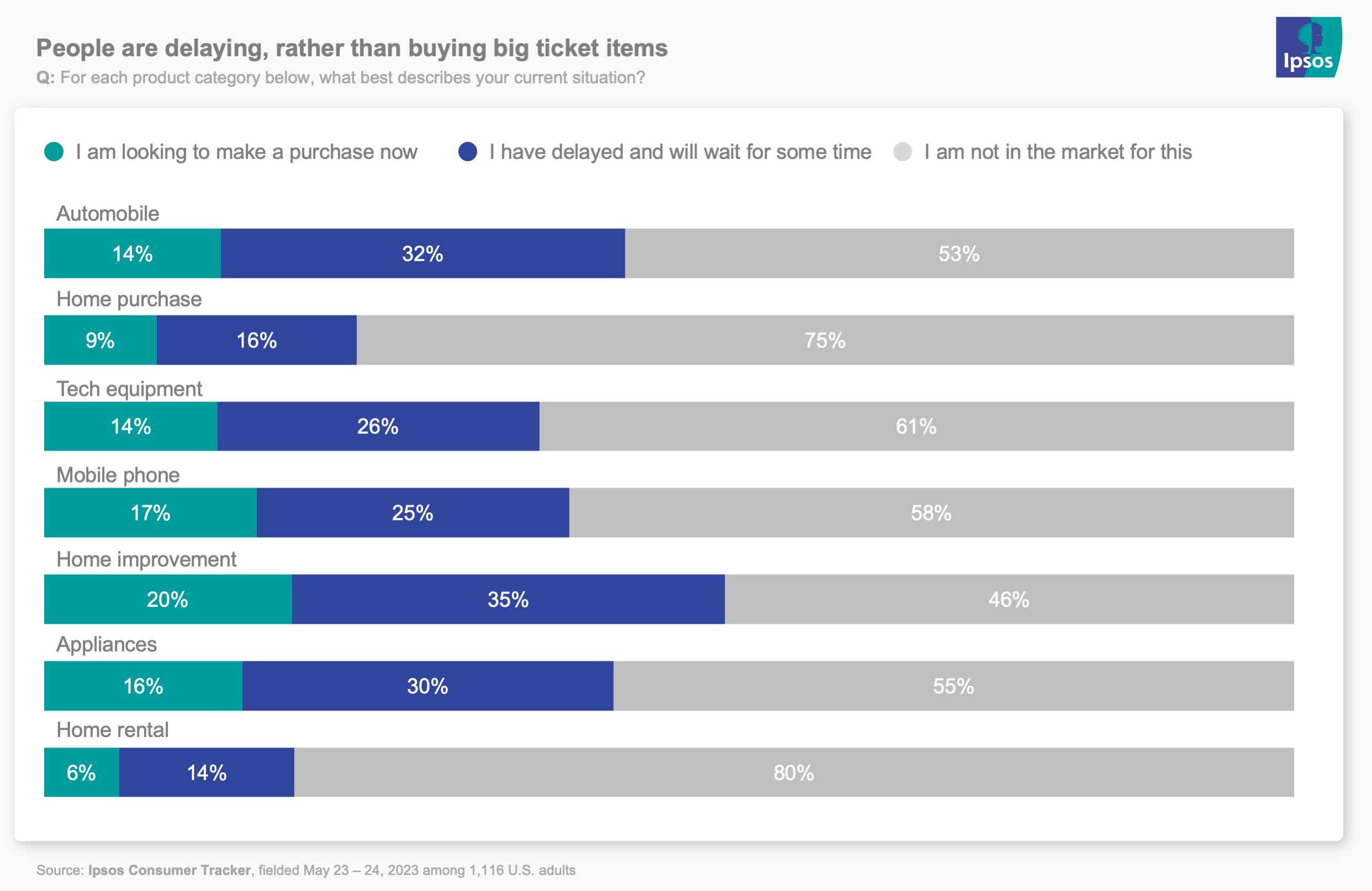
The Ipsos Care-o-Meter (Week of May 22, 2023)
Why we asked: How much do you know about a series of in-the-news events, and how much do you care about them? We explore the relationship between the two in each week’s Care-o-Meter.
What we found:
This wave presents us with some early comparison points both within this wave and to previous waves. Let’s dive in.
- People care a lot about tension with China, way more than the number who know about it, but still firmly in the know/care quadrant.
- People also both know and care about Trump having been found by a civil jury to have sexually assaulted and defamed E. Jean Carroll. Democrats cared far more (75%) to Republicans (48%).
- People knew less but cared about the same about the Durham report about the FBI’s investigation into alleged ties between Russia the Trump campaign in 2016. Not too much of a party split on that.
- Exactly half of America knows about octogenarian Martha Stewart appearing on the cover of the Sports Illustrated swimsuit issue. But few care. Curiously, older Americans were much more likely to not care at all (76%) than those under 35 (55%).
- People cared a bit more about Texas passing legislation restricting gender-affirming care for trans youth than they did when we asked about Montana in the last wave. And they cared more about Montana’s legislation about trans care than they did about Montana’s ban on TikTok. Surprising to me at least was that there wasn’t even much of an age split on not caring about the TikTok ban. Parents cared slightly more.
- We did an A/B test on asking about the person who attacked the home office staff of a Democratic congressman. We wondered if people would care differently if we mentioned his party affiliation. In a positive affirmation of society, no, care patterns didn’t really change. Democrats cared more regardless and only cared slightly more in the test for mentioning his party.
- And finally, sitting alone in the “don’t know, don’t care” quadrant is the Eurovision competition. If I dropped a Waterloo reference in here, how many of you would get it?
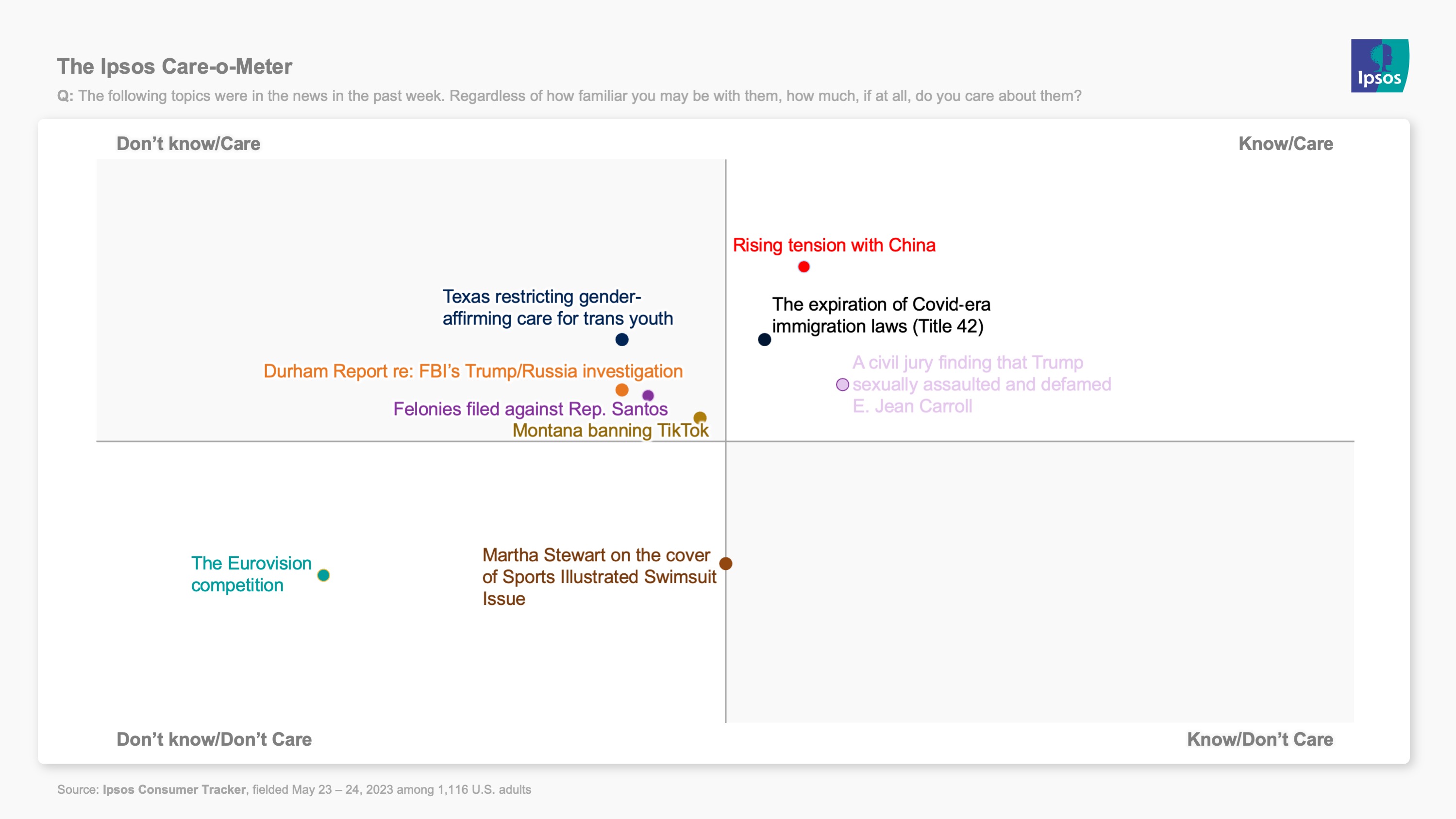
People are buying cheaper (and fewer) groceries as prices stay high
Why we asked: We have two things going on that drove us to ask about this. One is of course inflation, with food prices being quite high (though eggs are finally getting cheaper again as the avian flu runs its course). The other is that pandemic-era expanded Supplemental Nutrition Assistance Program (SNAP) benefits expired earlier this year.
What we found: Overall, nearly half of people reported buying food on sale and four-in-ten said they were buying less overall and buying cheaper brands. Only one in five said their purchases hadn’t changed at all. In a separate question we asked if people were receiving federal benefits for grocery (SNAP, WIC, etc.) and we see that people without federal assistance are twice as likely (25%) to say their habits haven’t changed than those who are (13%). Those on SNAP/WIC are twice as likely to say they are cutting back on fresh foods, and much more likely to have traded down to cheaper brands.
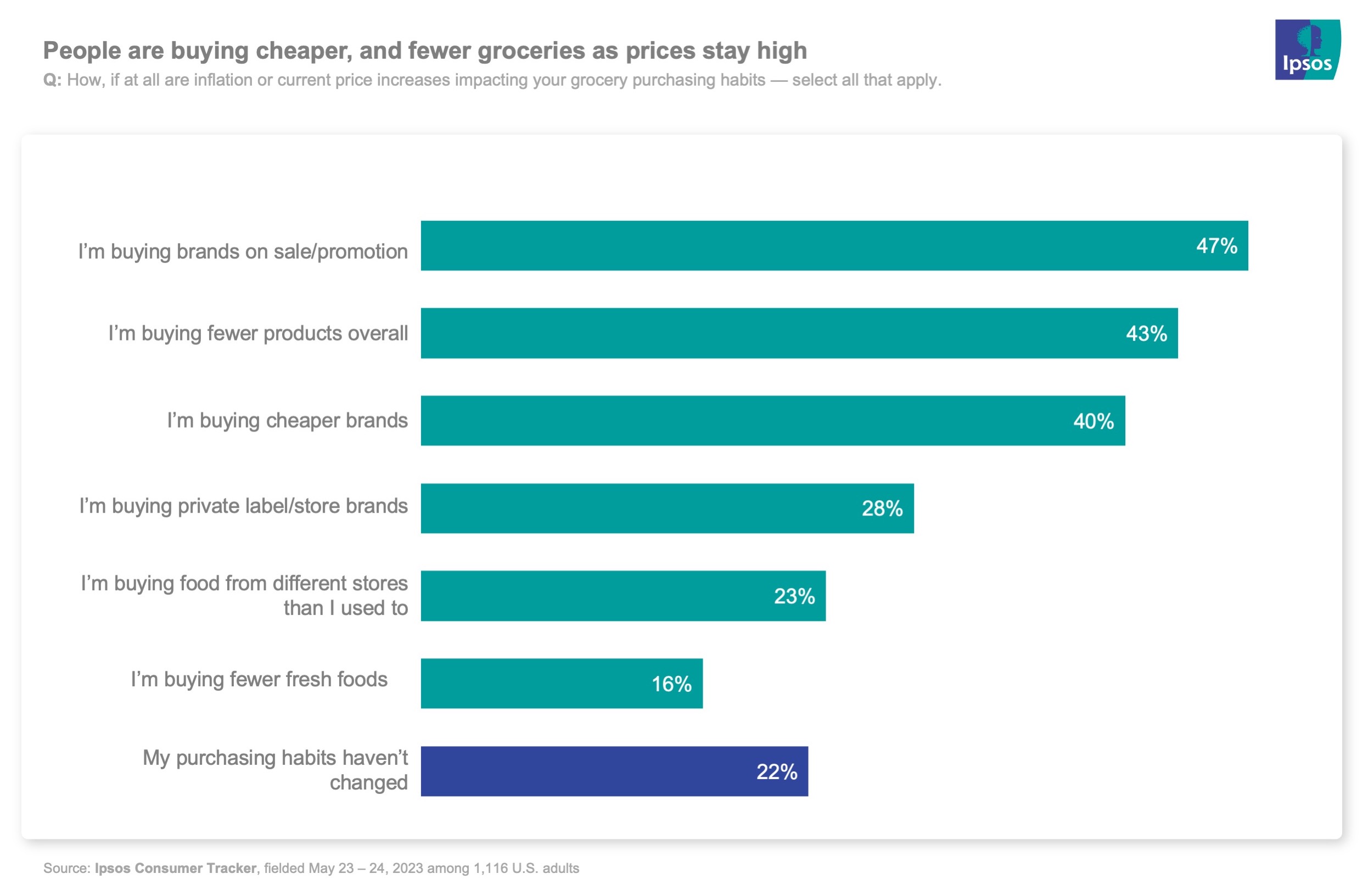
'Made in China' is a big turn-off at the moment
Why we asked: Because China. (SEE ALSO, where “rising tensions with China” plots in the Care-o-Meter).
What we found: People were nearly six times less willing to buy products (44%) if they noticed they were made in China than they were more likely (8%). Almost no one thought that label was a selling point at the moment. It’s interesting to contrast that to “Made in the U.S.” which is one of the most important purpose-driven (i.e., not price, quality, etc.) drivers of purchase intent, according to What the Future’s Purpose issue.
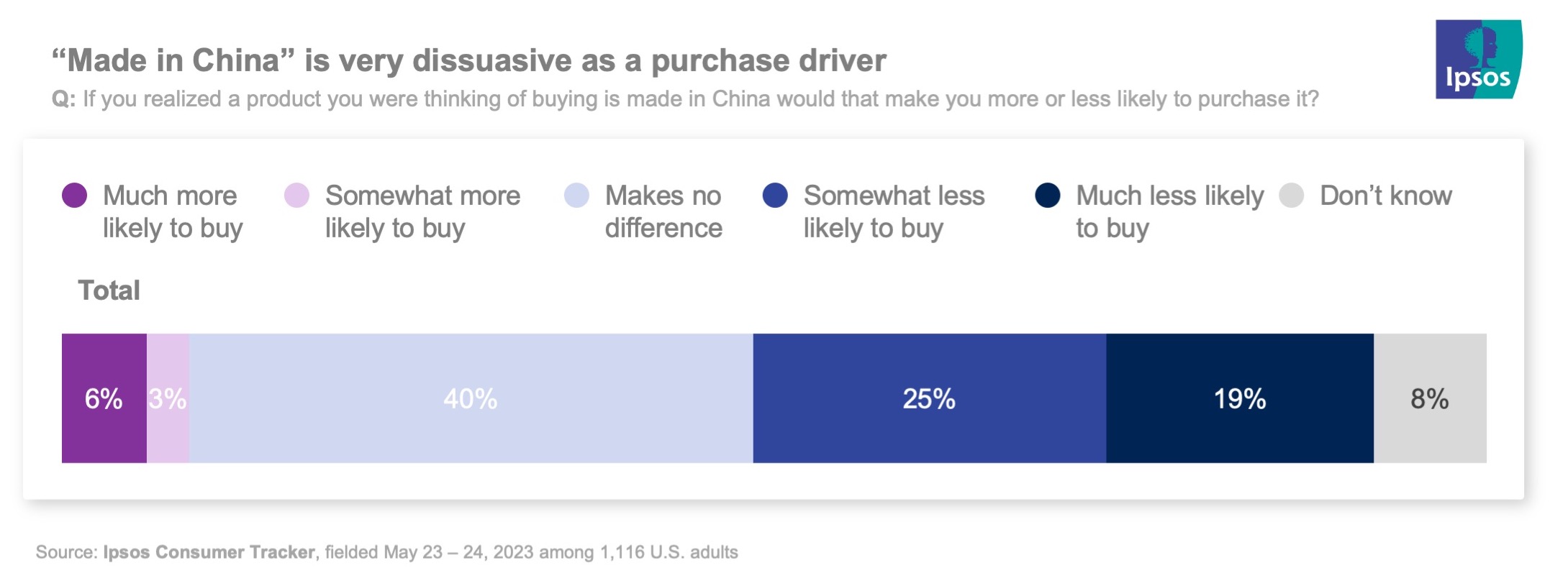
People are really uncomfortable with AI-generated political ads
Why we asked: The GOP recently ran the first AI-generated political add, using generative AI to create dystopian hellscapes from a supposed post-Biden ’24 world. And the Hollywood screenwriters continue to strike, partially because they are worried about AI taking their jobs. So we added some new options to this question, and trended some others.
What we found: People are really uncomfortable with the political stuff (which you know because you read the heading on this item). But, like, three times more uncomfortable (72%) vs. only 28% saying they’d be comfortable with that. Americans are also not into the idea of AI-generated news stories. For trended items, there was a 7 point fall-off in comfort with AI-generated TV and movie scripts since we asked just last wave. Could be a blip or a trend. We’ll check back in. But it’s clear that AI will be providing lots of tension points as the technology gets better and in more hands at an extraordinary rate.
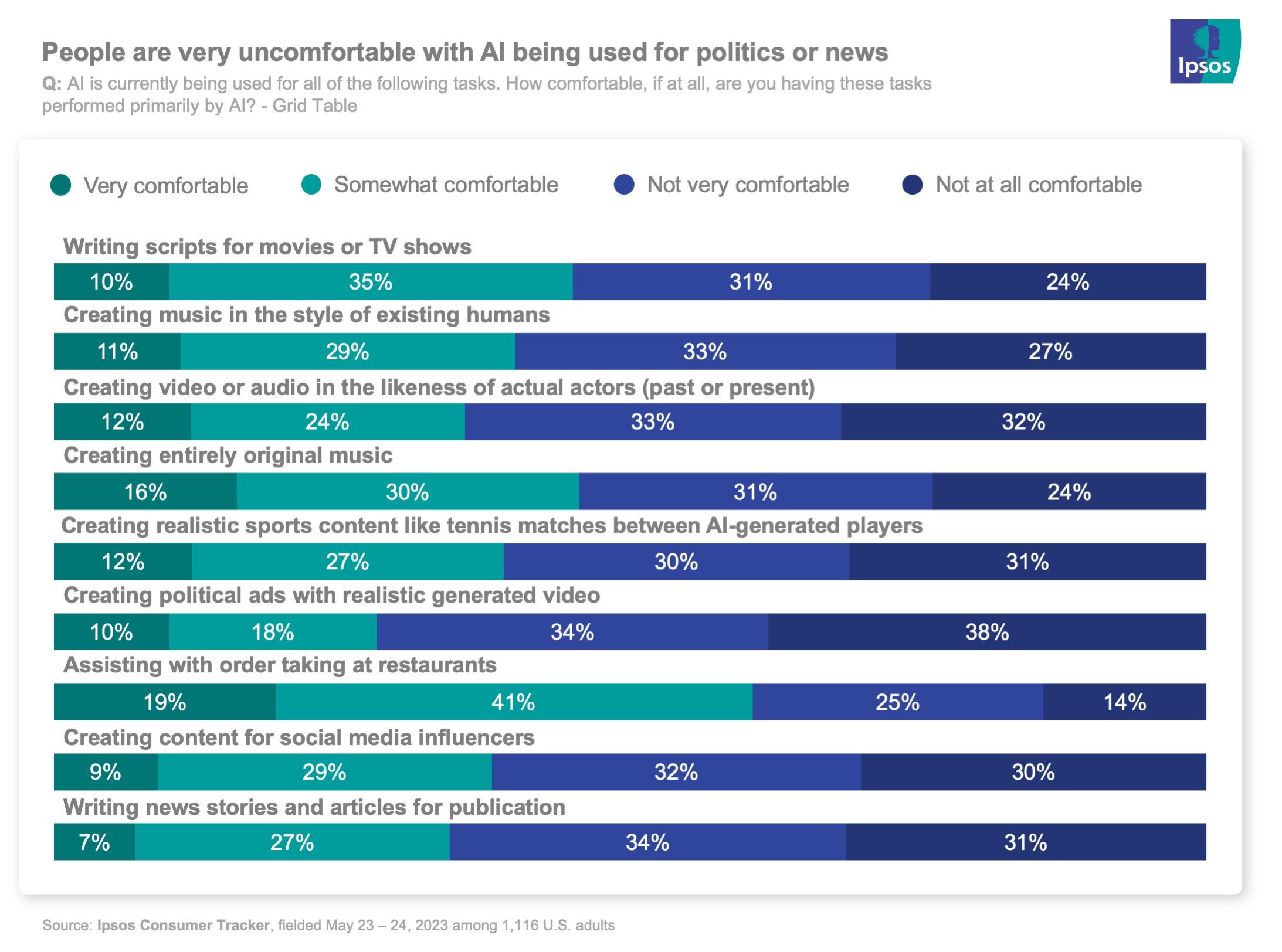
Signals
Here’s what we’re reading this week that has us thinking about the future.
- People without college degrees aren’t moving (via NYT)
- Deloitte, Goldman Sachs, Microsoft partner on blockchain (via Fortune)
- Baby born in UK with three DNA sources (via Guardian)
- Will AI mess up your drive-through order? (via Smithsonian) (See above for how Americans feel about this)
For complete toplines for all waves, please see the full data and methodology.


